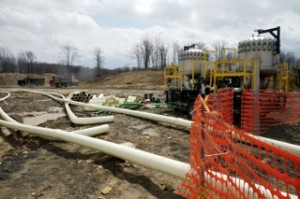Halifax’s Corridor Resources Ltd. has announced that Apache Canada Ltd., a subsidiary of Houston’s Apache Corporation, is giving up on unconventional gas exploration southwest of Moncton, in New Brunswick. This is a major setback for the drillers using hydraulic fracturing (a.k.a. fracking) on Canada’s east coast, since the $25 million Apache has already invested in dangerous unconventional gas drilling was expected to be supplemented by an extra $100 million.
Last year, Corridor, a smaller player in the gas industry, partnered with Apache in order to test the profitability of two horizontal trial wells into the Frederick Brook shale deposit located in the Elgin region of the province. While Corridor considers Elgin and the surrounding area to contain North America’s largest gas concentrations per square kilometer [pdf], the Will DeMille G-59 and Green Road B-41 test wells were not proving commercially viable.
When their partnership was announced, the companies were hoping to drill up to 480 wells, but with meager results from the two wells in phase 1, and a June 1st deadline to decide whether to invest additional millions or to opt out entirely, Apache balked and walked away from phase 2.
Gregory Chornoboy, senior oil and gas analyst out of Calgary with Jennings Capital, described the Apache decision as a major blow to Corridor and for unconventional gas drilling in New Brunswick: “It’s not a positive development for Corridor or the outlook for the Frederick Brook shale.”
Pumping the chemicals-laced fracking “slick water” deep into the shale rock formation did lead to a small amount of gas bubbling to the surface, but this drilling method was much more challenging than originally expected. Chornoboy added: “With the benefit of 20/20 hindsight…I can say that [slick water] was a mistake.”
The two wells for phase 1 were to be followed by 6-8 wells in phase 2, and upwards of 24 in phase 3.
Corridor and Apache’s misfortune means that the proposed 2013 mass commercialization of Elgin’s supposed enormous unconventional gas reserves is slowed, but maybe only for a short time.
John Herron, president of the Atlantica Centre for Energy, noted that Apache’s move does not change the fact that New Brunswick’s shale rock contains gas, but: “Until that discovery is made it’s, well, not made.”
Corridor still holds the leases for the area, and will likely be seeking a new partner if it opts to double-down and try again. Unfortunately for New Brunswickers, a likely candidate to take over for Apache is Houston’s Southwestern Energy (a.k.a. SWN in Canada) [podcast].
SWN’s American parent company is back in court after Arkansas families recently filed lawsuits over the pollution of their freshwater, and the associated health risks posed by destructive fracking.
Corridor is expected to discuss the next steps for Frederick Brook shale gas, in a corporate presentation which will be uploaded to their website on June 6th. Stay tuned.
Subscribe to our newsletter
Stay up to date with DeSmog news and alerts






